
By Liam Morgan |
The long-awaited updates to the Tokyo 2020 “playbooks” are due to be published later this month.
When they were first unveiled in February, athletes could have been forgiven for wanting more detail and concrete information that had been promised by the likes of the International Olympic Committee (IOC).
If organisers are to be believed, that much-needed clarification will come when the latest set of documents arrive on April 28.
An area of interest will be testing, a key weapon in the armoury of any organization hoping to stage major sports events – especially those Olympic in size – amid a global health crisis.
An incident at the World Men’s Curling Championship in Canada earlier this week highlighted how this particular area of testing, and the management of results, continues to pose a significant challenge – one which Tokyo 2020, the IOC and the International Paralympic Committee are acutely aware of but have not yet fully planned for.
This is the issue of false positives – people incorrectly told they have the virus – and how they are dealt with by the powers-that-be.
The curling event was suspended and speculation mounted that it would be called off before the medal matches could take place after four people within the tournament bubble in Calgary tested positive for COVID-19.
They were later found to have been caused by contaminated samples, which led to them being deemed as false positives by health authorities.
In short, an entire sporting event was placed into jeopardy by inaccurate testing results.
While contamination is rare, false positives have the potential to cause severe headaches for organisers during the rescheduled Olympic and Paralympic Games, should the events go ahead, particularly given the rigid nature of the rules outlined for all participants in the first edition of the playbooks.
What we do know at this stage is that athletes who return a positive coronavirus test will not be able to compete, as expected, and they could be placed into isolation at a Government-approved facility away from the Tokyo 2020 venues, most likely a hotel.
Those who come into “close contact” with someone who tests positive for COVID-19 are set to only be cleared to compete once they themselves have registered a negative test.
Athletes and other stakeholders have also been told to get tested immediately after being notified by the health reporting app or if called to do so by their COVID-19 liaison officer.
When it comes to the tricky issue of false positives, measures are being considered to prevent them stopping athletes from taking part at the Games, including the possibility of only barring those with a defined number of positives from competing.
This, however, will be easier said than done. Not only could false positives jeopardise the schedule – there are 339 events planned across 19 competition days, leaving little wiggle room for last-minute changes or alterations – but they may end up costing an athlete their Olympic dream.
Belgian athlete Eline Berings was on the receiving end of this problem at last month’s European Athletics Indoor Championships in Torun in Poland, where several athletes tested positive and the COVID-19 restrictions were widely criticised.
Berings was forced to withdraw from the semi-finals of the 60 metres hurdles after a positive test, later found to have been false. “I was sidelined in competition for no reason,” she said.
“It could have easily [been] solved by retesting immediately after my positive result came out.”
IOC President Thomas Bach insisted this issue would be addressed by those devising COVID-19 countermeasures for Tokyo 2020 and that lessons had been learned from the Championships in the Polish city.
Bach has openly admitted rapid testing will be crucial, but there are concerns over the accuracy of lateral flow tests, where results can be given after just 20 minutes.
Organisers will probably suggest one or two athletes missing out on their Olympic competition because of a false positive would not be a disaster as it would represent a minute percentage of the number of competitors at the Games.
They will undoubtedly claim it is better to be safe than sorry as there is also the possibility of false negatives, which pose a more general threat to the safety of the Games.
But others will say one is too many, given everything that athletes have put into their training during the worst global health crisis in a generation and how much they have done to get there.
Vaccines also do not entirely eradicate this issue. According to experts, people who have received the jab can still pass on the virus to others and be asymptomatic. The IOC has said a significant number of Olympic teams due to compete at Tokyo 2020 have already been vaccinated.
With the amount of people involved, positive tests at Tokyo 2020 are inevitable. It is how they are dealt with and managed that will define the success of the countermeasures and, potentially, the Games themselves.
It is up to those coming up with the various countermeasures, restrictions and rules that are set to be in place at the Games to ensure the testing system is of a gold standard.
False positives will provide a true test for the likes of the IOC and the Organising Committee, and they owe it to athletes to pass it with flying colours.
Republished with permission from insidethegames.biz.